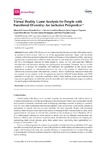Mostrar o rexistro simple do ítem
Virtual Reality Game Analysis for People with Functional Diversity: An Inclusive Perspective
| dc.contributor.author | Miranda-Duro, María del Carmen | |
| dc.contributor.author | Concheiro-Moscoso, Patricia | |
| dc.contributor.author | Lagares Viqueira, Javier | |
| dc.contributor.author | Nieto-Riveiro, Laura | |
| dc.contributor.author | Canosa, Nereida | |
| dc.contributor.author | Pousada, Thais | |
| dc.date.accessioned | 2020-10-19T10:25:14Z | |
| dc.date.available | 2020-10-19T10:25:14Z | |
| dc.date.issued | 2020-08-20 | |
| dc.identifier.citation | Miranda-Duro, M.d.C.; Concheiro-Moscoso, P.; Viqueira, J.L.; Nieto-Riveiro, L.; Domínguez, N.C.; García, T.P. Virtual Reality Game Analysis for People with Functional Diversity: An Inclusive Perspective. Proceedings 2020, 54, 20. https://doi.org/10.3390/proceedings2020054020 | es_ES |
| dc.identifier.issn | 2504-3900 | |
| dc.identifier.uri | http://hdl.handle.net/2183/26460 | |
| dc.description.abstract | [Abstract] Virtual reality (VR) allows us to simulate everyday life environments with realism and in an immersive environment, with the use of the appropriate hardware. People with functional diversity, either because of environmental barriers or because of their reduced mobility, have fewer opportunities to participate in different daily activities or risk situations outdoors. Therefore, VR can be a technological resource for these people to access, try out, and experience different environments and scenarios, offering new participation experiences. Therefore, the aim of this proposal is to analyze the properties and determine the possibilities of the virtual reality applications available on commercial platforms for use in the practice of rehabilitation and intervention aimed at people with functional diversity. This is a transversal, descriptive study that has focused on the analysis of the 40 applications from the STEAM Virtual Reality and VIVE platforms for High Tech Computer Corporation (HTC). After analysis, it has been observed that there are no applications available that are fully accessible and with a minimum degree of usability for use by people with functional diversity. | es_ES |
| dc.description.sponsorship | This work was supported in part by some grants from the European Social Fund 2014-2020. CITIC (Research Centre of the Galician University System) and the Galician University System (SUG) obtained funds through Regional Development Fund (ERDF) with 80%, Operational Programme ERDF Galicia 2014-2020 and the remaining 20% by the Secretaría Xeral de Universidades of the Galician University System (SUG). Specifically, the author MCMD obtained a scholarship (Ref. ED481A 2018/205) and the author PCM (Ref. ED481A-2019/069) to develop the PhD thesis. On the other hand, the diffusion and publication of this research was funded by the CITIC, Research Centre of the Galician University System with the support previously mentioned (Ref ED431G 2019/01) | |
| dc.description.sponsorship | Xunta de Galicia; ED481A 2018/205 | |
| dc.description.sponsorship | Xunta de Galicia; ED481A 2019/069 | |
| dc.description.sponsorship | Xunta de Galicia; ED431G 2019/01 | |
| dc.language.iso | eng | es_ES |
| dc.publisher | MDPI AG | es_ES |
| dc.relation.uri | https://doi.org/10.3390/proceedings2020054020 | es_ES |
| dc.rights | Atribución 4.0 Internacional | es_ES |
| dc.rights.uri | https://creativecommons.org/licenses/by/4.0/ | * |
| dc.subject | Virtual reality | es_ES |
| dc.subject | Functional diversity | es_ES |
| dc.subject | Accessibility | es_ES |
| dc.title | Virtual Reality Game Analysis for People with Functional Diversity: An Inclusive Perspective | es_ES |
| dc.type | info:eu-repo/semantics/conferenceObject | es_ES |
| dc.rights.access | info:eu-repo/semantics/openAccess | es_ES |
| UDC.journalTitle | Proceedings | es_ES |
| UDC.volume | 54 | es_ES |
| UDC.issue | 1 | es_ES |
| UDC.startPage | 20 | es_ES |
| dc.identifier.doi | 10.3390/proceedings2020054020 | |
| UDC.conferenceTitle | 3rd XoveTIC Conference; A Coruña, Spain; 8–9 October 2020 | es_ES |






